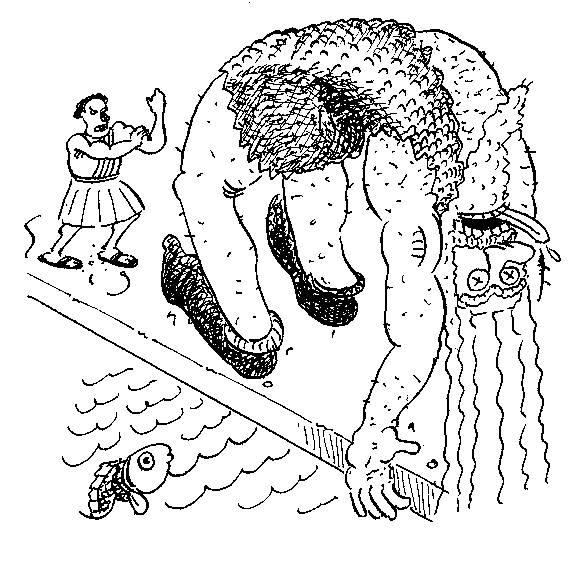
I’m currently reading Polybius’s “Rise of the Roman Empire” and stumbled on a quote that begs for elaboration. In book VI, Polybius offhandedly remarks, “Many Romans have volunteered to engage in single combat so as to decide a whole battle.” Has this ever actually happened? Have two armies gathered on a battlefield prepared to slaughter each other, only to have the outcome decided by a single sword fight between two grunts?
— Grant Moore
[hr]
There are plenty of stories, not so many documented cases. But you can see the appeal. Many a warrior nervously awaiting battle has thought: I’m as into violence as the next guy. But I wish it were more of a spectator sport.
The most famous accounts of single combat are legendary, in multiple senses of the term: Paris versus Menelaus, David versus Goliath. It’s known to have occurred in some tribal societies, including the Maori, the Tlingit, and aboriginal cultures in Australia and Brazil. But these are minor disputes, not epic battles.
One well-known story of champions deciding a war involves the Horatii. As told by the Roman historian Livy, early Rome was at war with the nearby city of Alba Longa. As the two armies prepared to do battle, the Alban dictator Mettius Fufetius realized whichever side won would be so weakened that the neighboring Etruscans would likely swoop in and finish off victor and vanquished alike. So he pitched the Roman commander on the idea of single combat. What emerged was even more remarkable: triple combat.
By unlikely coincidence, each army had a set of triplet brothers — the Horatii of Rome and the Curiatii of Alba Longa — who agreed to face off. In short order two Horatii were killed while all three Curiatii sustained injuries. The remaining Horatius then strategically retreated, picking off the Albans one by one when they came after him. Then, we’re supposed to believe, the Albans said to the Romans: OK, you win.
Livy later reports a likelier tale of single combat circa 361 BC involving the Romans and the Gauls. The two armies were camped on opposite banks of a river when a Gaul of “extraordinary stature” approached the bridge between them and taunted the Romans, calling for the bravest to come out and fight. An average-looking Roman named Titus Manlius rose to the challenge and administered a fatal shellacking to his oversized opponent. The Gauls freaked and ran.
The Roman polymath Poseidonius tells us that as of 100 BC or so the Gauls were still at it: when opposing tribes lined up for battle, often the bravest or most foolhardy warriors would strut before their enemies, brag, and generally behave like assholes till somebody on the other side challenged them to single combat. Sometimes the result satisfied the collective bloodlust and everybody went home happy; sometimes it made things worse.
We hear little more about single combat till 1016 AD, when Edmund Ironside of England and the invading Canute of Denmark were repeatedly hurling their armies at each other with great loss of life but no definite results. According to one dubious 12th-century account, this ended when the weary English nobles, asked to prepare for yet another go-round, told the king: you want to win this one so bad, bubba, fight it yourself. Both leaders agreed, and they duked it out till Canute suggested calling it a draw, whereupon the two ruled their kingdoms together.
One more legend, this one from Russia: when Prince Mstislav fell upon the Kasogi tribe of the northern Caucasus in 1022, their leader, Prince Rededya, challenged his opponent to single combat. They decided to wrestle, which ended up not going well for Mstislav. He prayed to the Virgin Mary for help, promising to build a church in exchange. Deal, said the Virgin, whereupon Mstislav threw his opponent to the ground and stabbed him to death, surely not what the Lady had in mind. However, Mstislav did build the church.
For an example of single combat that may have actually occurred, it’s hard to beat the one between King Naresuan of Thailand and Crown Prince Minchit Sra of Burma during the battle of Nong Sarai on January 18, 1593. Apparently not liking the odds for his army, Naresuan suggested to Minchit Sra that they settle things personally with a duel on their war elephants. The prince agreed, and the armies formed a ring around the belligerents with their own war elephants, surely a sight to see. After a protracted battle, the older king killed the young prince and went on to conquer much of southeast Asia.
Why isn’t single combat more common? Because, as Machiavelli pointed out in his commentary on Livy, it’s stupid if anything important is at stake. A safer method, used to advantage during the Cold War, was proxy warfare, in which each side armed the combatants in a remote battle zone. If your favorites got annihilated, too bad, but at least you minimized casualties on the home front. Today the need is less urgent, but the practice lives on. It’s called the NFL.
— CECIL ADAMS
Send questions to Cecil via straightdope.com or write him c/o Chicago Reader, 350 N. Orleans, Chicago 60654. Subscribe to the Straight Dope podcast at the iTunes Store.
